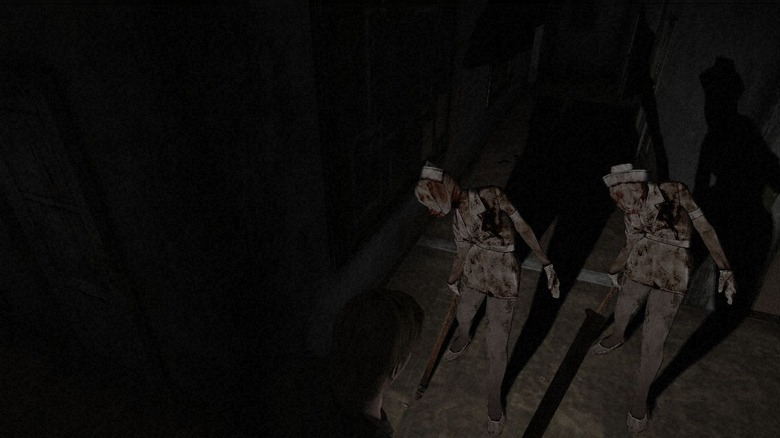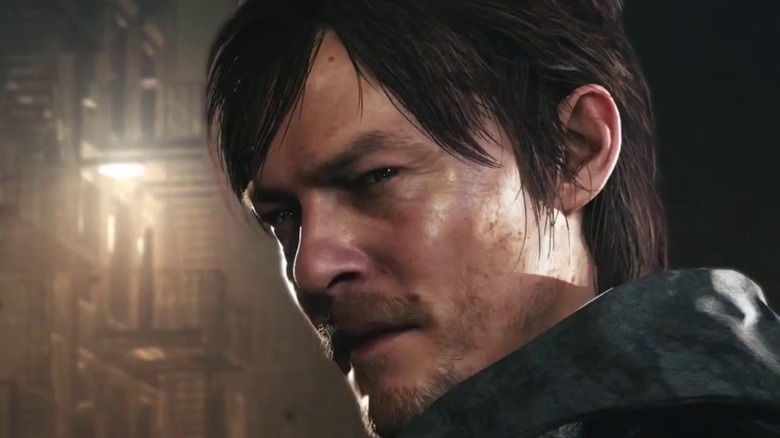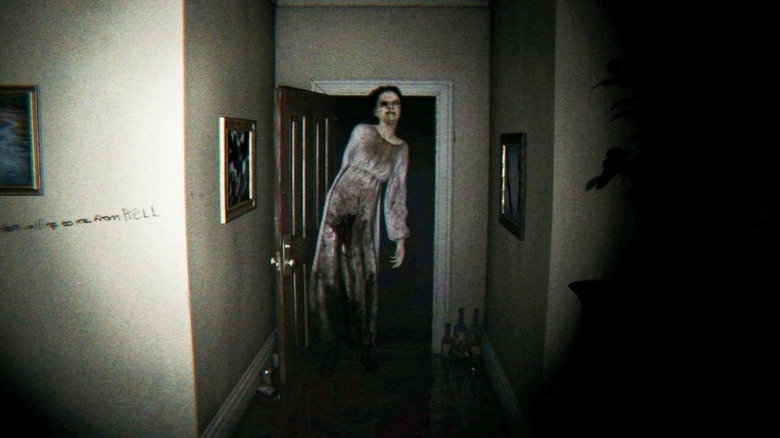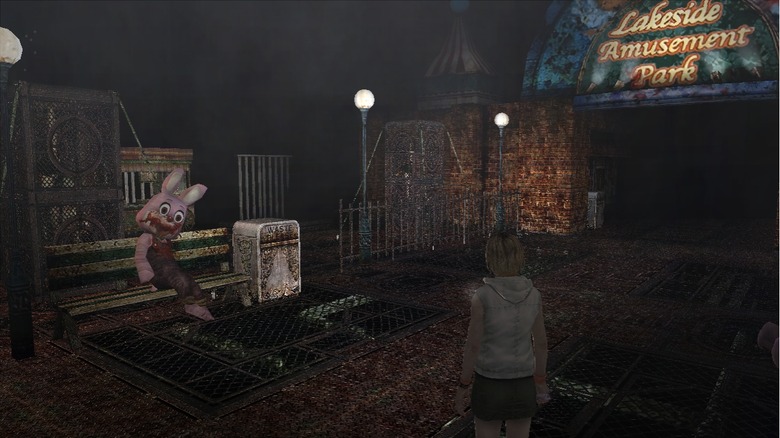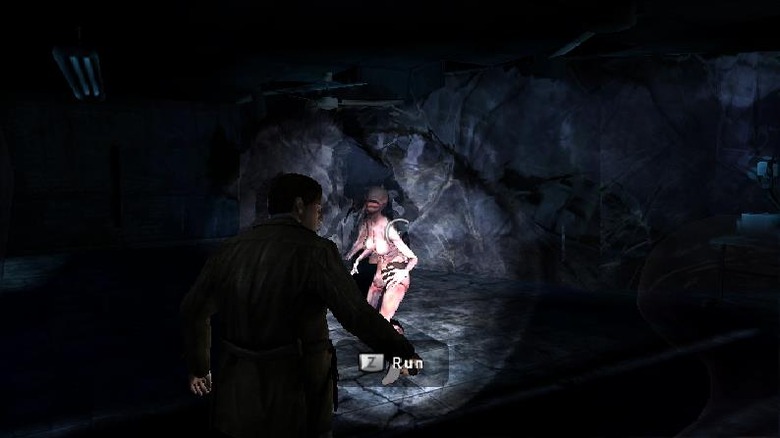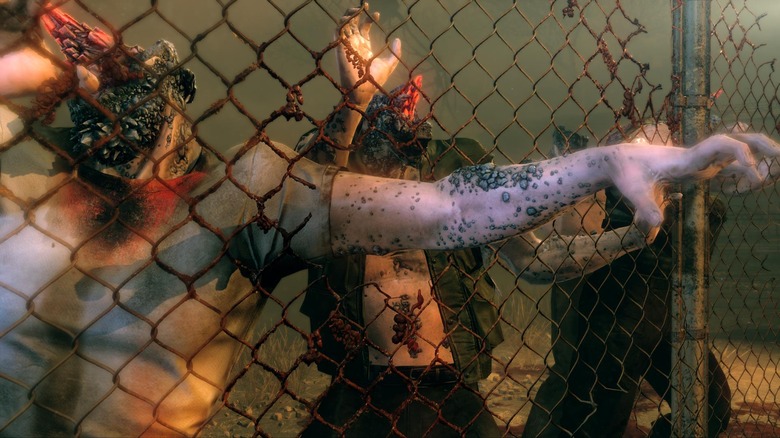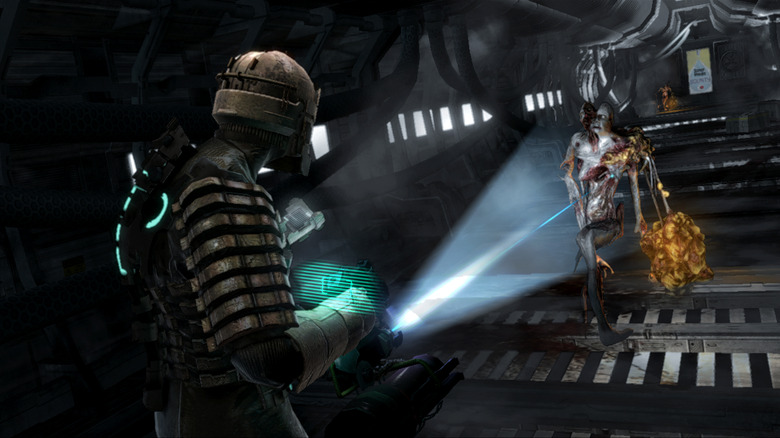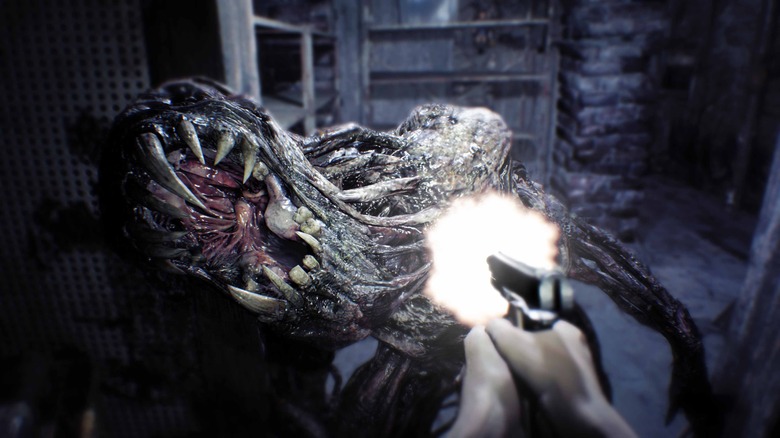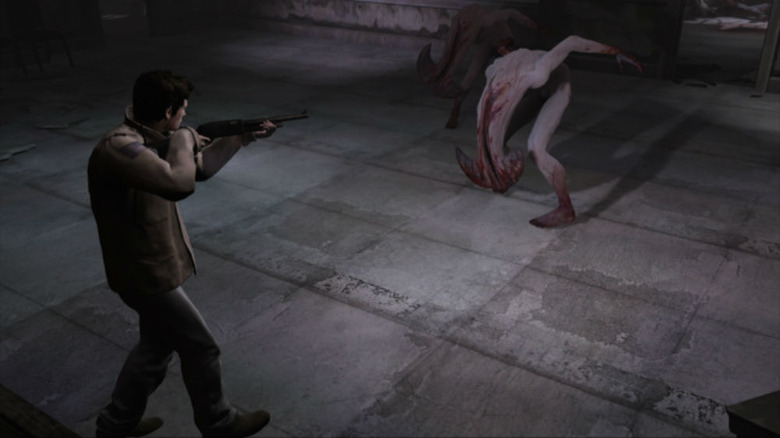Why You May Never See Another Silent Hill Sequel
Silent Hill may still be one of the most beloved survival horror franchises in gaming, and many may still look back on Silent Hill 2 as the most disturbing game ever made, but publisher Konami doesn't seem to be interested in any of that. Besides a failed attempt to make a new Silent Hill game in 2015 — which we'll get to in just a second — there hasn't been any movement in the franchise since 2012.
What happened to this titan of horror gaming to make it completely disappear? Changes at Konami are most likely to blame for the six-year absence of the franchise, but the way players enjoy games has also changed. It also doesn't help that, while 2012 was a particularly busy year for Silent Hill — with the release of two new games, an HD collection, and a movie — it was one full of weak releases that garnered terrible reviews.
A changing gaming landscape, a shift in Konami's business strategy, and poor reviews might have closed down the haunting town of Silent Hill for good. Here's why the hills may have gone silent forever.
Konami hasn't show any interest
While Silent Hills never actually reached shelves, it remains the most infamous installment in the series due to the behind-the-scenes drama that led to the game's cancellation. The game was first announced through a demo released on the PlayStation 4 in August 2014.
The demo, simply titled P.T. (short for "Playable Teaser"), would reveal to those players brave enough to complete its nonsensical (and horrifying) loop through a haunted house that a new Silent Hill was in development and that it would star The Walking Dead's Norman Reedus. The masterminds behind the project? Metal Gear creator Hideo Kojima and Academy Award-winning director Guillermo del Toro, who'd previously tried to get another horror game made at THQ before the publisher went bankrupt.
Kojima and his team, along with del Toro, seemed poised to take Silent Hill in a new, more terrifying direction until the Metal Gear creator had a falling out with Konami in early 2015 and left the company. By April 2015, Silent Hills had been canceled.
Konami has not announced a new Silent Hill game since, perhaps cutting its losses now that it would never be able to deliver Kojima and del Toro's vision for the franchise. Things may very well remain that way for the foreseeable future.
Konami even pulled the legendary demo from the PlayStation Store
To add salt to the wound, it didn't take Konami long after canceling Silent Hills to take down P.T. from the PlayStation Store. By pulling the excellent, mind-boggling demo, Konami erased the last remnants of Kojima and del Toro's take on the Silent Hill series. Needless to say, Silent Hill fans were absolutely outraged by the turn of events and Konami's failure to deliver on what looked like a promising new direction for the series.
In the past six years, Konami has basically answered complaints and criticisms with silence, trudging ahead without making any significant announcements about Silent Hill (although the publisher did release a Silent Hill-themed pachinko gambling machine in 2015 for those fans who hadn't yet picked up pitchforks against the company).
Konami's evident disinterest in releasing anything new in the franchise for the last six years, and its unwillingness to save a Silent Hill project fans were actually excited about, shows that perhaps the company doesn't even really need the franchise anymore. Six years is a long time to sit on a video game franchise if you actually care about it.
Even the re-release of the two best installments was an afterthought
Despite owning some of the most beloved franchises in video games, Konami isn't particularly good at remastering or rereleasing its biggest hits. While Metal Gear did receive two solid HD remaster collections a few years back, Konami did a particularly dreadful job with the Silent Hill HD Collection for the Xbox 360 and PlayStation 3 (and a forgettable one with the recent Castlevania: Requiem collection for that matter).
Released in 2012, the Silent Hill HD Collection collects Silent Hill 2 and Silent Hill 3 in one package (for some reason, the first Silent Hill isn't part of the deal, even though it's the installment that launched the franchise and has a direct connection to the third game). Unfortunately, some saw this rerelease as a bit of an afterthought, as opposed to the celebration this iconic horror series deserved.
Eurogamer questioned the collection's many technical issues, including a lack of textures in some sections of the game, the lackluster fog effects, its failure to run at true 720p and 60 fps, and the poorly rendered cinematics. While IGN did award the collection with a 9/10, most critics were in consensus that the rerelease left something to be desired. The questionable condition of the HD collection meant to commemorate two of the greatest Silent Hill games ever made suggests that celebrating the franchise isn't that high of a priority for Konami. If the publisher doesn't care about the franchise's past, why would it care about its future?
The post-Team Silent games haven't enjoyed acclaim
From 2007 to 2012, Konami decided to outsource the production of Silent Hill games to Western studios, disbanding the legendary Team Silent, the developers behind the first four installments. The first title from a Western studio was Silent Hill: Origins, a prequel of the series, developed by Climax Studios and released in 2007. It was generally well-received. Silent Hill: Homecoming, developed by Double Helix Games and released in 2009, didn't fare nearly as well.
IGN wrote in its review, "The gameplay has been reduced from a tense psychological experience fraught with spine-tingling jumps and scares to a generic, predictable action title set in the location with good graphics and a great soundtrack."
Climax Studios followed Homecoming with a Wii exclusive called Silent Hill: Shattered Memories, which is perhaps the best of the Western Silent Hill releases. But whatever Shattered Memories accomplished was quickly erased by Downpour, developed by Vatra Games and released in 2012.
"There are a few fleeting moments in Downpour that offer legitimate thrills, but on the whole, the experience is very weak," read IGN's 4.5/10 review. "The gameplay is dull and uninspired, the combat is loose and clunky, and the technical presentation is simply a mess."
When Kojima was called in to lead the new Silent Hill project, there was no doubt that the franchise was in desperate need of a facelift. But with Kojima gone, there's probably no one left at Konami with the will or ability to save this series from itself.
These days, Konami only makes PES and Metal Gear games
These days, Konami seems to be more interested on safer bets, like yearly installments of Pro Evolution Soccer series, which has been a pretty steady seller for the company over the years. In fact, Konami announced in April 2018 that it had sold 100 million copies of PES, a pretty impressive milestone for any franchise.
The only other major AAA franchise that has received any major attention from Konami is Metal Gear. Konami most recently released Metal Gear Survive, a zombie-filled cooperative game that failed to really make a splash with critics. At the very least, it showed Konami trying to make an effort to continue the series beyond its original creator's involvement — in a new, not-so-welcome direction, mind you, but an attempt just the same.
That's definitely more attention than Silent Hill has received in the past few years. Since Silent Hills was canceled, the only Silent Hill game released by Konami has been a pachinko gambling machine. Since all other Konami franchises have more or less gone dormant, it's unlikely the horror classic will see much more support from its creator.
Survival horror games don't sell well
According to some in the games industry, the survival horror genre isn't very fruitful when it comes to turning a profit. AAA horror franchises like Dead Space and Resident Evil have struggled to meet sales expectations in the past. For Dead Space, its failure to appeal to a broader audience proved to be the nail in the coffin for the well-received space horror series.
"Survival horror is hard," Zach Wilson, former senior level designer at the now-closed Dead Space studio Visceral Games, explained to Gamesindustry.biz. "Horror games in general are expensive to make and hard to sell. People would give us the feedback that they love Dead Space but don't buy it 'cause it's too scary. Kind of works against itself."
Game designer Cliff Bleszinski also questioned the sustainability of AAA survival horror releases as a business model: "In the $60 disc-based market, horror doesn't fly — it's the ultimate 'Campaign Rental' that's played for two days and traded in and I'm sure EA knows this."
More recently, the critically acclaimed Resident Evil 7 also failed to meet Capcom's sales targets, showing that even masterful horror experiences can be hard sells to a general gamer audience. With the odds stacked against even the best the genre has to offer, Konami isn't in any hurry to roll the dice on another Silent Hill game that it might not make a profit on.
Survival horror games tend to be linear
Survival horror games tend to be linear experiences by nature, taking the player from point A to B in a story, whether the plot is about a character trying to find a loved one in a cursed town or trying to escape a ship full of space zombies. The scares themselves often require a bit more hand-holding, forcing a player to walk through a dark hallway or venture into a basement at a specific moment to get the right effect.
According to at least one publisher, these sorts of linear experiences aren't as popular as they once were. Speaking at a conference, EA CFO Blake Jorgensen explained how gaming trends have reportedly changed in the last decade, describing why the company decided to shut down Dead Space developer Visceral Games and cancel its upcoming Star Wars action-adventure game.
"As we kept reviewing the game, it continued to look like a much more linear game [which] people don't like as much today as they did five years ago or ten years ago," Jorgensen said.
Whether this is actually true or not, there's no arguing that more and more companies are taking a "games as a service" approach with their titles, releasing games that they can keep players invested in and continue to monetize way beyond their initial release. Silent Hill's linear nature doesn't really lend itself to that sort of business model, which makes it a relic from the past that Konami won't be in a rush to dig up.
Konami has mostly abandoned AAA development
Perhaps the biggest reason Konami won't be making another Silent Hill game any time soon is that it doesn't need to invest in one at all. In fact, since Konami mostly shifted focus from AAA game development to mobile gaming and gambling machines, the company has posted huge financial gains.
For the fiscal year ending in March 2018, Konami broke records. The company reported a $413 million profit, an almost 25-percent increase from the previous year. The massive sales were mostly credited to Pro Evolution Soccer 2018 and Yu-Gi-Oh! Duel Links, a mobile title based on the popular card game.
In fact, the latter title is one of the biggest factors of Konami's success. Marketing intelligence firm Newzoo reports that Konami "now earns more than four times as much on mobile than it does on console with titles such as Yu-Gi-Oh! Duel Links."
The move to mobile games certainly hasn't hurt Konami, which has found a way to circumvent AAA development costs and still make more money than it would on the latest Metal Gear, Castlevania, or Silent Hill. At this rate, Konami is never going to bother with another Silent Hill game again.

